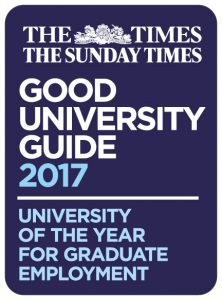November 9, 2016, by pressoffice
How can employers and HE collaborate to better global recruitment?
Dr Nalayini Thambar, Director of Careers and Employability at The University of Nottingham considers how employers and higher education can collaborate to better global recruitment in a post-Brexit world. The University of Nottingham has been named University of the Year for Graduate Employment according to the Times and Sunday Times Good University Guide 2017.
For some, small is beautiful, but generally speaking we are encouraged to think big – globally in fact. And then there is the bringing together of the two; at the University of Nottingham one of our core principles is to ‘think globally, act locally and engage personally’.
With fully developed campuses in the UK, China and Malaysia, and with 28% of our UK-based students representing over 150 countries, that is not a hollow ambition, but we believe the only way to deliver an outstanding, yet authentic, student experience.
This approach has much to commend it, particularly in unsettling Brexit-shaped times. In response to recent events we, and many universities like us, are increasing our outward gaze and nurturing our worldwide partnerships to sustain our global reach and view.
However, global graduate recruitment brings us all down to earth with a bump.
Global graduate recruitment challenges
Even in a global university, the day-to-day reality of engaging with our valued recruiters is focussed on, although not exclusively, UK-based graduate programmes for students who have the right to work here. Also, based on our discussions with employers, where there are opportunities for graduates to become ‘global’ through placements and rotations, once established many of them prefer to stay put.
So, how do universities address the company challenge to recruit a ‘global workforce’ while helping our students to fulfil their ambitions?
Our experience of dealing with recruiters suggests that we need to understand their global reach although recruitment is managed ‘in country’, link to their overseas equivalents and highlight those opportunities to our students.
For students who have come to the UK to experience its internationally renowned higher education system, we need to equip them with the skills and knowledge to be a successful recruit anywhere in the world and then help them to make contacts and find opportunities across the globe.
This is often facilitated through alumni communities, even staff based overseas, to highlight and promote student and graduate talent. They also offer cultural insights and contacts, arrange video-conferenced employer presentations across continents and run careers fairs.
The Brexit effect
But, as UK PLC, are we all missing something by taking this approach? Surely we should use the Brexit clarion call to think differently about the challenges we face.
Trading in global markets, developing new ideas and products and growing a network of international partners and suppliers rely on access to the best homegrown and recently–arrived talent.
Now seems the time to seek stronger and clearer partnerships between universities and recruiters to attract student talent, from all backgrounds and cultures, who can contribute to business success, even in these uncertain times.
To do that, would mean thinking globally, acting locally and engaging personally; between us, portraying companies in the UK in their true global sense – not just in terms of entry requirements, selection processes and timescales, but in terms of international reach, suppliers, partners and impact.
 This would help our students to see companies as global, wherever they seek to work, and encourage an expectation, if appropriate, that thinking globally may lead to an expectation of travel. As well as driving company brand value and awareness across countries, this would broaden the business education of students of all disciplines.
This would help our students to see companies as global, wherever they seek to work, and encourage an expectation, if appropriate, that thinking globally may lead to an expectation of travel. As well as driving company brand value and awareness across countries, this would broaden the business education of students of all disciplines.
Of course there will be local recruitment targets and we should continue to work together to meet them, but by engaging personally we will be best able to understand those areas of mutual benefit, where particular business challenges can be addressed and where new approaches could boost established practices, which may be less fit-for-purpose in these changing times.
So, in my view, global recruitment requires global conversations. Not just in terms of geography, but in terms of everything that universities and employers as representatives of companies wish to achieve, and how we might do that together.
Students and graduates will understand better the relevance of their university experience to the world of work, and organisations will thrive through the attraction of talent from and across the world. That’s got to be worth a chat.
Dr Thambar’s blog first appeared as part of AGR’s newsletter.
No comments yet, fill out a comment to be the first

Leave a Reply